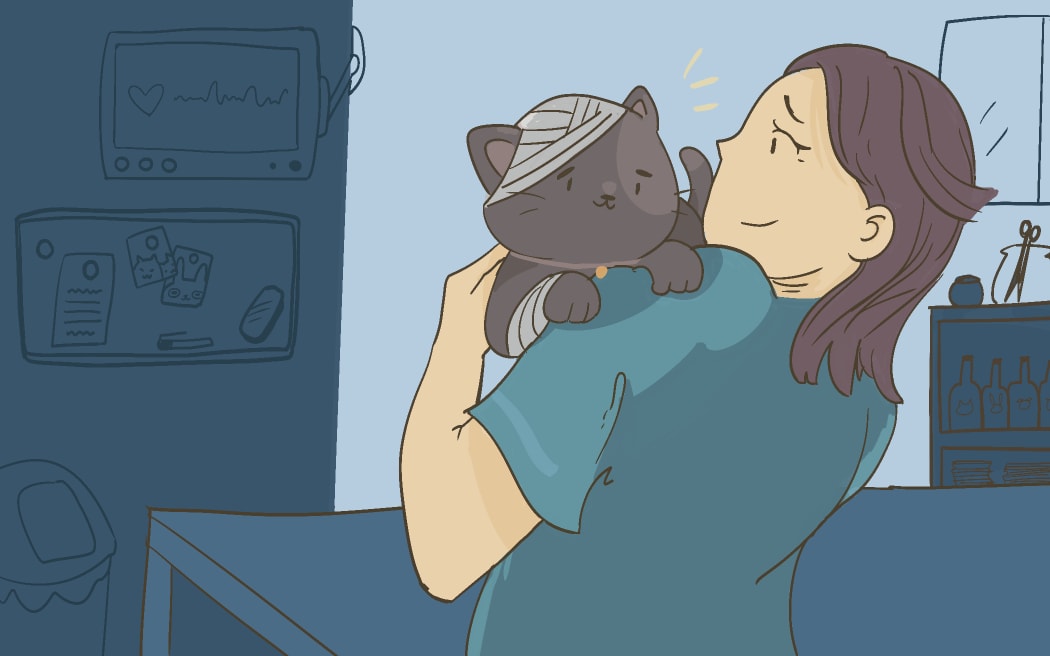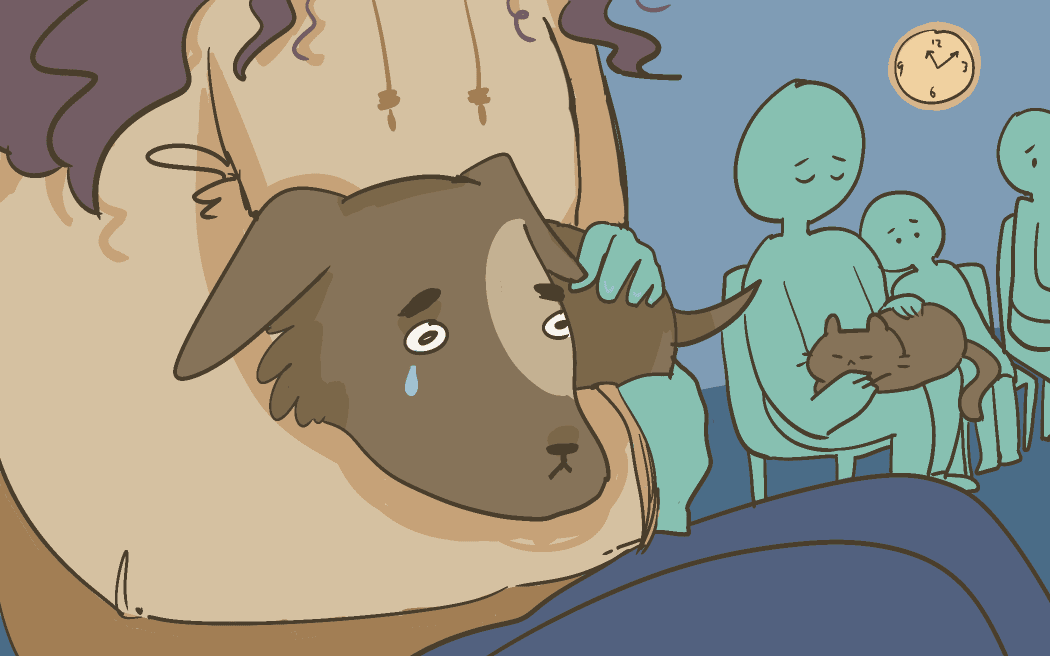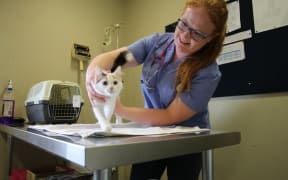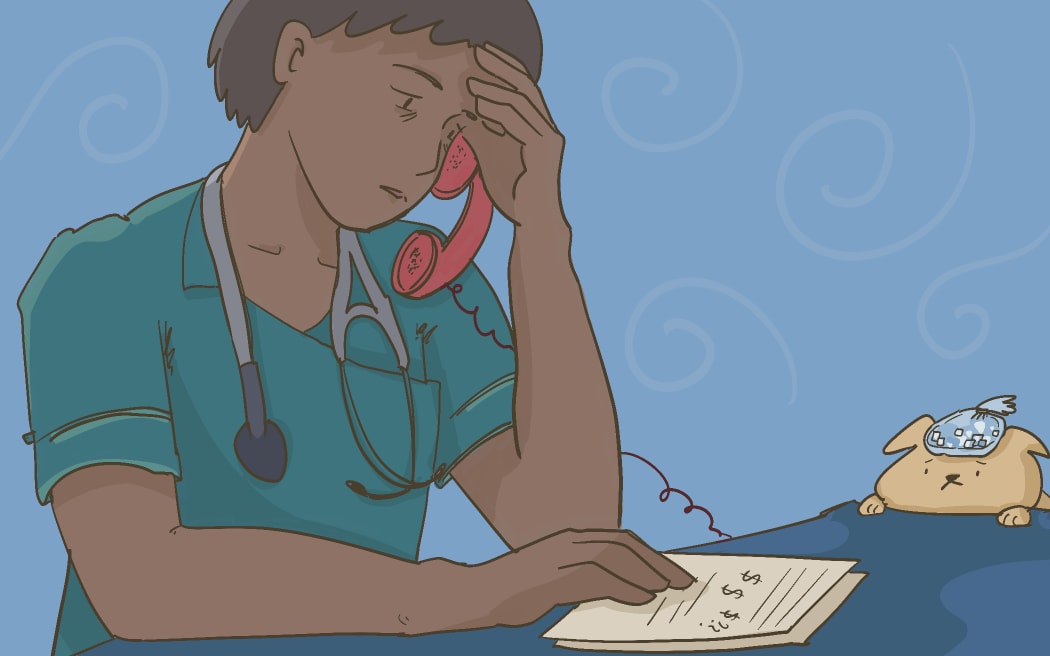
Photo: RNZ/Michelle Tiang
Vets are feeling the pressure as a shortage of staff is causing trouble across the industry, and it's heavily impacting staff in the emergency and shelter sector.
RNZ went behind the scenes at Veterinary Specialists Aotearoa after-hours hospital in Henderson one Saturday evening, when the centre was down a vet and forced to ask pet owners to see if they could find another clinic.
Urgent cases, like when one owner called and say their dog had badly hurt its leg and desperately needed treatment, were allowed to come in anyway.
On the night RNZ visited, staff were dealing with a variety of animals, including a sick English bulldog that needed sedation, an injured greyhound who needed a dressing change and to see its owners, a corgi with bladder stones and three sick cats. One of them didn't make it.
Out front, reception handled a variety of calls on topics such as stray cats, an injured rabbit, a cat that hurt its nail, and one owner who called in from Japan asking for an update on her dog's condition.
VSA managing director and vet Shalsee Vigeant said the pressure takes its toll on people.
"If you didn't do everything you needed to or you didn't quite get the job done like you wanted, you might have your accounts left to do the next day or emails unanswered, if that happens here you have pets that don't get the care they need, and that's why we're all in it. So, I think you actually get the heart kind of hurt."
#WATCH Vets are feeling the pressure as a shortage of staff is causing trouble across the industry, and it heavily impacting staff in the emergency and shelter sector.
— Morning Report (@NZMorningReport) March 2, 2023
A vet at a busy Auckland emergency clinic told RNZ how it affects them. pic.twitter.com/2I2Kv6qOtx
Added to that, some members of the public have a shorter fuse and vet staff are left facing the brunt of it.
"People have gotten a lot less tolerant of things, and with staffing shortages our wait times are much longer than they used to be, getting appointments is much harder, and when you come in to an emergency setting, or even if you're having to come to a specialist, that situation as a pet owner is a lot more stressful, and a lot more scary, there are things going on that put you in that mindset."
Dr Vigeant said making it easier to get vets into New Zealand has helped, but it's not just vets that are needed.
"Getting people into this country for the profession isn't as easy as it could be, especially our nurses. The vets are on a visa, the green list, so it's easy for them to come in, but it's not for nurses.
"We can't run a vet hospital without nurses."
NZ Veterinary Association spokesperson Sally Cory said a combination of factors are brewing the perfect storm for the profession, including fatigue, some workers easing off on the number of hours worked and increased pet ownership.
She's urging pet owners to be calm and plan ahead to make sure they're not caught out by the shortage.
"If they're trying to book in appointments or surgeries for the pets, just allow plenty of time. Just be aware that those appointments, unless urgent, are not going to potentially happen the same day or the next day that they may happen even a few weeks out for some of those appointments."

Photo: RNZ/Michelle Tiang
Missed routine care adding to pressure - SPCA
SPCA Auckland centre head veterinarian Aoife Cannon said Covid-19 disruption meant a lot of routine care like vaccinations and desexing got missed, and the organisation is seeing the impact of that now.

Aoife Cannon holds a kitten as it gets a brief examination. Photo: RNZ/Katie Fitzgerald
"Up to 10 people come in a day with the dog with parvo. Usually, they're so sick there's absolutely nothing we can do with them. We also are having year on year more and more kittens coming through, that would all be prevented by just desexing. "
Cannon said there are huge wait times across the country, especially in emergency clinics, and it can be hard on staff and owners.
"Everyone's very, very stressed. Really, every clinic has the animals' best interests at heart. So, if you're waiting, it's probably because there's an animal there that is just really more critical than your animal right now."
Similarly to Vigeant, Cannon said immigration has taken a load off from the vet side, but there is still a shortage of nurses and receptionists.
Often those staff end up handing some difficult situations.

Photo: RNZ/Michelle Tiang
"Most people who want to be vets, they don't realise that a huge part of your job is talking about money. That's why I left general practice and have come to SPCA, because we don't have to have conversations with people about money anymore. That's really really draining and a lot of that falls back on nurses, receptionists."
Cannon said vets aren't in it to make money, even if there is a perception of that. Procedures like desexing had been undercharged for in the past to get people in the door, but that is no longer sustainable as costs rise.
"Supplies are more expensive, rent is more expensive, everything is more expensive. So, there really isn't money to just say 'here you go, everyone have a pay rise', and in the past the nice aspects of the job and the rewarding aspects of the job like seeing the animals do well made up for the bad aspects of the job. Now everyone's so tired, everything is so stressful. That's just not enough for them anymore."

